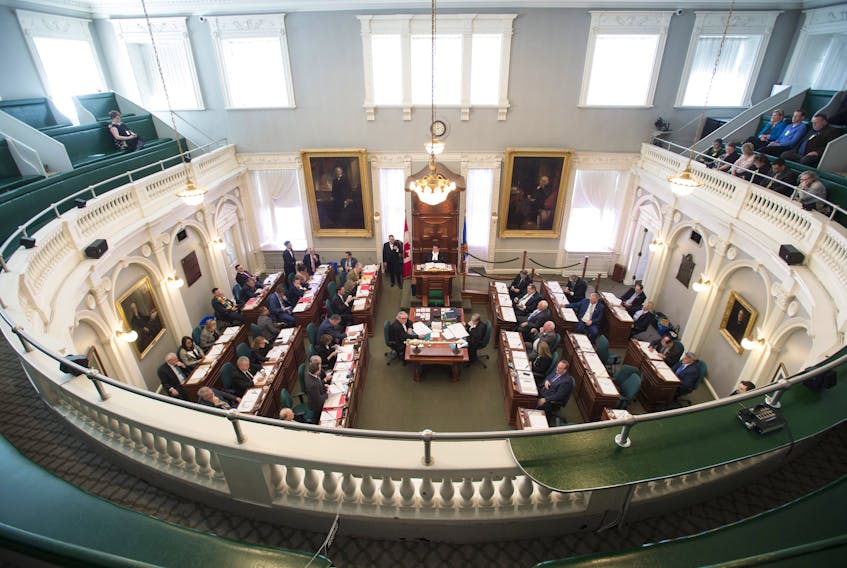Reconciling the words and deeds of politicians is a fairly reliable source of disappointment.
In Nova Scotia, the provincial Liberal government soars rhetorically in the cause of social justice, dignity for all citizens, and support for those most in need, but its actions appear modest, minimal or even miserly.
This week’s Throne Speech opened a new session of the legislature with language and largess to illustrate the point.
“Government is committed to building a stronger province where all Nova Scotians have the dignity, self-esteem and self-confidence they need to enjoy productive and fulfilling lives.
“All across the province, people are recognizing the benefits of taking steps to make their businesses and communities more accessible.”
And how will the province ensure this movement towards accessibility not only continues but gains momentum? It will deliver a plan to make Nova Scotia an “accessible province” by 2030 – a dozen years hence.
The province believes that’s a realistic target, all things considered, while those for whom access is limited or nonexistent are understandably underwhelmed.
Nova Scotians with disabilities have been advocating for greater accessibility since John Buchanan was premier, only to be told by the government of Premier Stephen McNeil, which purports to agree with them, that it will take another 12 years to get it done.
Nova Scotians with disabilities have been advocating for greater accessibility since John Buchanan was premier, only to be told by the government of Premier Stephen McNeil, which purports to agree with them, that it will take another 12 years to get it done.
Participation in society and in their communities is, for disabled people, contingent on access yet the province is content to move at a pace that will deny the opportunity to participation to hundreds, perhaps thousands of Nova Scotians for the entirety of their lives.
In the meantime, a phalanx of provincial lawyers troops into a human rights hearing to defend the government against charges that it actively discriminates against disabled people by not providing them with the appropriate level of support to live – with dignity, self-esteem and self-confidence – in the community.
The province’s action on access for disabled Nova Scotians falls far short of its rhetoric. The same can be said of the government’s lofty words and lowly deeds related to the poorest Nova Scotians.
“Whatever the situation, people in need must be supported (by the government) to help build the income security they need to lead fully independent lives,” the Throne Speech affirmed.
So, what bold new action has the province taken, or is planning, in pursuit of that worthy aspiration?
Folks trying to survive on income assistance in the Halifax region now get a bus pass.
On Oct. 1, the province will let people on income assistance keep a little more of the money they earn before clawing back their assistance.
And, men and women in homeless shelters and transition houses will get a few extra bucks for personal items.
It is sometimes said that every little bit helps, and clearly that message has penetrated the provincial government which provides a very little bit.
And then there is health care. The province says every Nova Scotian deserves timely access to primary healthcare – that used to mean a doctor, not so much anymore – and it’s the government’s job to make it happen.
This is the exception that proves the rule. The rhetoric is more subdued, because the government knows that the list of people looking for a doctor is only getting longer. So, after reciting measures intended to beef up primary care, the speech concedes: “We know there is more to be done, and government is working hard.”
The rousing rhetoric returns when the government goes bullish on the economy. Nova Scotians are told that they are living at “a pivotal moment in (Nova Scotia’s) history.”
There are, says the government, signs that Nova Scotia is becoming an economic powerhouse and if Nova Scotians seize the day they can “propel Nova Scotia toward even greater prosperity.”
“There is a buzz about this province.” Those words, found near the end of the speech, are not a reference to cannabis legalization, as first assumed. The speech held no such reference.
The “buzz” is coming from “the national stage and beyond” and it’s about Nova Scotia, where direct flights to China may soon originate and there’s a real Christmas tree that holds its needles three months longer than anybody should expect.
Now you’re talking.
Jim Vibert, a journalist and writer for longer than he cares to admit, consulted or worked for five Nova Scotia governments. He now keeps a close and critical eye on provincial and regional powers.









